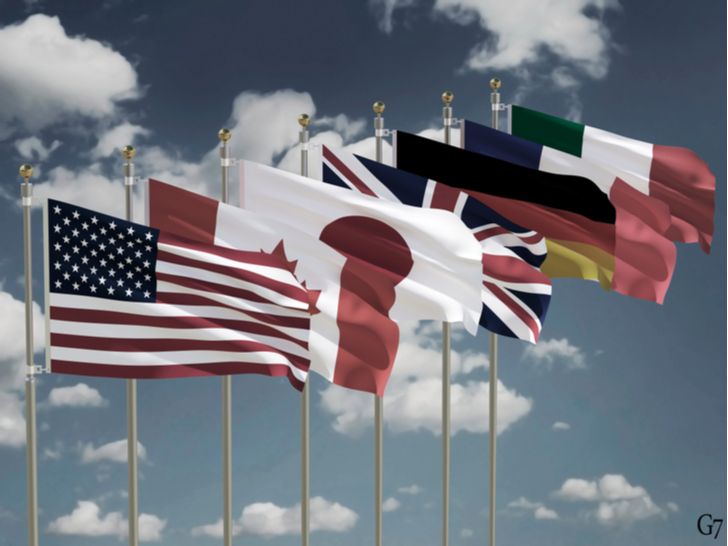The disaster that was this past weekend’s G7 Summit in Charlevoix, Quebec, was a major step backward in the two countries’ relations.
Here’s why U.S. and Canadian consumers and investors will suffer as a result of the White House’s reckless approach to Canadian trade.
Sticks and Stones
Forget for a moment that President Donald Trump called Canadian prime minister Justin Trudeau “meek and mild and dishonest and very weak” minutes after leaving the summit as Canada’s guest.
Or the fact Trump economic adviser Larry Kudlow accused Trudeau of “stabbing the U.S. in the back” or trade adviser Peter Navarro suggesting “there’s a special place in hell for any foreign leader [Trudeau] that engages in bad faith diplomacy with President Donald J. Trump.”
These are merely words, words that Justin Trudeau will brush under the carpet because he knows the end game is securing a long-term trade agreement that works for both countries.
Let’s not assume Trudeau’s measured response to the mudslinging, however, is a sign that Canada will fold like a cheap suit under the pressure of Trump and his minions.
Mixed Feelings About Trudeau
As a Canadian, I have mixed feelings about Justin Trudeau — I voted for him in 2015 but have been unimpressed by his performance in the last year or so — but there is no amount of dissatisfaction that would lead me to abandon my country’s best interests as Shark Tank’s Kevin O’Leary (a Canadian) did when appearing on CNN June 10.
He started out Ana Cabrera’s interview saying the right things.
“Canada and the U.S. are the biggest trading partners … we’ve got to work this out,” stated O’Leary. “Trump has been very disruptive this weekend in Canada and caused chaos here.”
All you have to do to know that’s true is search “Trump Canada” on Twitter. There is some serious name-calling going on.
U.S. Dairy Industry Already Gets a Leg Up
But then O’Leary got into some cockamamie opinion that Trudeau was only getting tough because of all the votes he’d lose from Quebec dairy farmers if Canada were to dump its supply-managed dairy system, losing all credibility with Canadian viewers.
The reality is that Canada’s system works keeping family farms in business, something the U.S. is losing with every passing day to big corporations.
“President Trump seems to want nothing less than to see Canada’s strong, stable and, efficient dairy farmers and sector wiped out,” Pierre Lampron, president of the Dairy Farmers of Canada, said in a statement. “There is no monopoly on supporting national dairy interests. Just as President Trump is going to bat for his country’s dairy sector, we call on Prime Minister Trudeau to stand up for our dairy farmers.”
Here’s the thing O’Leary misses about Trump’s tirade about Canada’s tariffs on milk, cheese and butter — currently 270%, 245% and 298%, respectively — the U.S. does the same thing for its dairy farmers.
A 588-page 2018 report commissioned by the Dairy Farmers of Canada suggests that 73% of U.S. dairy farmer’s revenues are subsidized directly or indirectly by the federal, state and local governments.
“The report estimates that in 2015, the support granted to U.S dairy producers represented approximately C$35.02/hectolitre – the equivalent of 73% of the farmers’ marketplace revenue,” stated international trade research firm Grey, Clark, Shih and Associates. “USDA data also reveals that U.S. dairy farmers operate at a loss, and have a cost of production that is higher than what they earn from the marketplace.”
Trump Is Barking Up the Wrong Tree
President Trump wants Canada to drop its tariffs so that U.S. dairy farmers can dump their excess production north of the border, a move that would seriously affect Canadian dairy farmers.
However, Wisconsin dairy farmers don’t see Canada as the problem.
“The fuss President Trump raised about Canada damaging Wisconsin farmers during his visit to the Dairy State, ignored what Wisconsin dairy farmers actually said at the time and since,” wrote international trade strategist Peter Clark in April. “The issue in the dairy farmers’ view was overproduction, and reduced consumption due in large part to the popularity of plant-based dairy products.”
And there’s another problem with Trump’s argument.
The U.S. currently restricts milk imports to 3% of domestic consumption. So, while Canada exports just $110 million to the U.S., the U.S. is exporting five times that amount to Canada. You can’t have your cake and eat it, too.
The Bottom Line on G7 Summit
Something like 22% of the cars sold in the U.S. in 2017 were made in Canada and exported south of the border.
Like the dairy issue, Trump is barking up the wrong tree if he thinks the auto sector’s willingly going to move production from Canada to the U.S. An all-out trade war would cost U.S. consumers almost as much as it would Canadians.
It’s time for President Trump to stop the chest-thumping and name calling and get serious about creating a trade agreement with Canada that works for both parties.
Otherwise, North American stocks will crater, hurting everyone … including the richest 1%.
As of this writing, Will Ashworth did not hold a position in any of the aforementioned securities.

